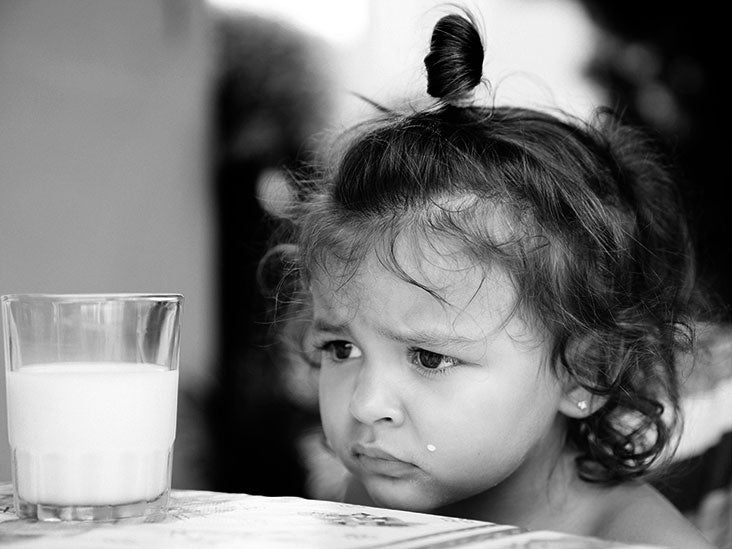Milk allergy in babies: Causes, symptoms, and diagnosis - Medical News Today

Cow's milk allergy is common in babies and young children. It can cause skin reactions, digestive symptoms, and breathing difficulties.
A milk allergy is an adverse reaction to food containing cow's milk. It can cause a range of symptoms, including eczema, hives, vomiting, and diarrhea. The severity of symptoms can range from mild to severe.
Doctors can diagnose milk allergy using a skin test or blood test. Caregivers should avoid giving products containing milk to infants with a milk allergy.
Milk allergy is the most common food allergy in infants and young children. Around
A milk allergy is an immune system response that happens when a child's body recognizes cow's milk protein as a foreign invader and produces antibodies against it. The antibodies then attack the protein, which can lead to symptoms such as vomiting, diarrhea, hives, eczema, or hay fever-like symptoms.
There are two main types of milk allergies: IgE-mediated and non-IgE-mediated. IgE-mediated milk allergy is the most common type, with symptoms usually appearing within minutes to hours after consuming milk or milk products. Non-IgE mediated milk allergy is less common and may not cause an allergic reaction until hours after consuming the product.
The symptoms of a milk allergy can vary from person to person and depend on factors like age, severity, and when the allergen was consumed.
Babies with milk allergies may have skin reactions such as:
- rash
- hives
- swelling of lips, face, and eye area
They may also have digestive symptoms such as:
Other symptoms include breathing difficulties, asthma-like symptoms, and symptoms similar to hay fever, such as a runny or blocked nose.
It is also possible for a child to have a delayed reaction. These include:
Symptoms of a severe allergic reaction
In some cases, babies with a milk allergy may experience sudden and severe symptoms. These include:
- swelling in the mouth or throat
- shortness of breath
- labored or noisy breathing
- wheezing
- tongue swelling
- swelling and tightness in the throat
- dizziness or collapse
- becoming floppy and pale
This is called anaphylaxis, and it can be fatal. If this happens, people should call 911 for immediate medical attention.
Learn more about dairy allergy here.
Not all allergic reactions require treatment. Most symptoms of an allergic reaction will resolve within a few hours.
Caregivers should make a doctor's appointment after the baby's first allergic reaction. The doctor can advise them on what to do if it happens again. Sometimes, a baby's allergic reaction can be more severe on the second exposure to the allergen.
If a baby has symptoms of a severe allergic reaction, caregivers should call 911 immediately.
If a doctor has prescribed an adrenaline autoinjector or Epi-Pen, caregivers should administer it according to the doctor's instructions.
Learn more about what to do if a baby has an allergic reaction.
A doctor or allergist usually diagnoses milk allergies. They will ask about the child's medical history and do a skin prick test.
They will also ask a variety of questions about the baby's symptoms. Before the appointment, it is helpful if caregivers keep a food diary of what the baby eats and the symptoms they experience.
Doctors may order a blood test to confirm the diagnosis. IgE (Immunoglobulin E) antibodies in the blood indicate an immune reaction to an allergen.
A doctor may also recommend an
It can be difficult for caregivers to find milk-free foods, as many items contain milk products, including bread, cereals, yogurt, and ice cream. However, it is important to eliminate all milk from a baby's diet if they have a milk allergy.
Milk proteins can pass through breastmilk. If a child who drinks breastmilk has a milk allergy, the person producing breastmilk should
The only way to treat a milk allergy is to avoid food products containing milk.
People should read all food labels before giving new foods to a baby with a milk allergy.
Some other foods to avoid include:
- butter
- buttermilk
- casein and caseinate
- chocolate
- cream
- crème fraiche
- ghee
- whey
- yogurt
People should also consider over-the-counter (OTC) antihistamines for managing mild allergic reactions. Healthcare professionals may recommend parents or caregivers carry epinephrine injections in case of a severe allergic reaction.
Is my baby allergic to milk or lactose intolerant?
Lactose intolerance is not an allergic reaction but a digestive disorder resulting from the inability to digest lactose. The symptoms of lactose intolerance are usually milder than those of a milk allergy and may include gas, bloating, or diarrhea after drinking or eating dairy products such as milk.
Can a baby outgrow a milk allergy?
Around
Most children will outgrow their milk allergy by the time they are 6 years old. Some people will continue to have a milk allergy throughout their lives. Doctors should assess children every 6–12 months to see if they have grown out of their milk allergy.
A milk allergy is a common adverse immune response to the proteins found in cow's milk. Milk allergy can manifest in many ways, from mild to severe. The most common symptoms are abdominal pain, diarrhea, vomiting, and skin reactions such as hives or eczema.
If people think a baby has a milk allergy, they should consult a doctor or allergist to confirm a diagnosis. Diagnosis may involve a skin prick test, blood test, or an oral food challenge.
To avoid an allergic reaction, caregivers should eliminate milk products from a baby's diet.
Most children outgrow their milk allergy by the age of 6 years.

Comments
Post a Comment